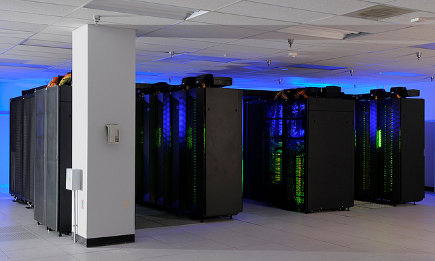Big Data: a desert of information

Louis Vertegaal, director at NWO, is responsible for the disciplines of astronomy, chemistry, computer science and mathematics. In short: all disciplines in which working with vast amounts and diversity of data is common ground. “Especially astronomy is a pioneering discipline”, Vertegaal says.
Vertegaal’s story resembles that of ASTRON-director Marco de Vos on ScienceGuide. The universe in all its complexity inhibits a gigantic amount of scientific data, which makes working in a certain discipline a very complex task. Vertegaal: “You can see this in the development of the Square Kilometer Array (SKA) in South-Africa and Australia, that new radio telescope they are about to install. The amount of data traffic it will generate is enormous.”
Order in the data-chaos
According to Vertegaal it’s the informaticians who are now creating order in the data-chaos. The Netherlands eScience Center is founded to provide for interdisciplinary interaction. “I’ve known the director of the eScience Center, Jacob de Vlieg, for a long time, we worked together years ago. What they are doing at the eScience Center is helping scientists to cooperate with businesses on a demand-driven basis.”
One example of such a cooperation in Big Data is the DOME project, in which ASTRON and IBM together develop extremely fast and energy efficient computer systems to read, store and analyze the data that is gathered by the LOFAR radio telescope in Westerbork (NL). “It is encouraging to see the cooperation in tackling the Big Data-challenges here”, Vertegaal says. “Especially on the user side, where scientists are working with these amounts of data.”
Wanted: excellent informaticians
“We cover the excellent Big Data-users in the Netherlands, so what we now need is excellent informaticians who are ready to work those data,” says Vertegaal. The eScience Center is crucial in that process.
“When I visited NASA a few years ago, with the help of large supercomputers they were able to predict the route of hurricane Katrina. Nowadays we have come much further. If you see what’s possible just in the field of jungle computing. By connecting different types of computers we are now able to develop a huge computing potential, that’s incredible!”
New fundamental questions arise
At the same time Vertegaal witnesses a shift in the way we are doing science, now that the computational power is growing and big data is coming up: “The new fundamental questions we can ask ourselves are so different that a new type of science might arise. A digital cross section of philosophical books and writings enables us to ask totally different questions. It’s hard to predict where this will lead, but I am certain that it will be possible to edit data, that one can manage things one could not have not been doing before. Undoubtedly this will raise new questions we would have never thought of earlier.”
Meest Gelezen
Wederom intimidatie van journalisten door universiteit, nu in Delft
‘Burgerschapsonderwijs moet ook verplicht worden in hbo en wo’
Raad van State: laat taaltoets nog niet gelden voor hbo-opleidingen
Vrouwen houden universiteit draaiende, maar krijgen daarvoor geen waardering
Extra geld voor bètafaculteiten is daar nooit terechtgekomen
